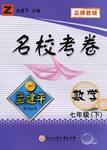题目内容
Dear Kate,
It's really good to know you are covering for me while I'm away on the training course. Thanks so much. Knowing that you'll be teaching the kids has made me relaxed. I'm sure you'll get on fine with them. I thought I should leave you some notes on a couple of things that are planned for this week, and other advice that will hopefully see you through to next Friday!
• Tuesday: The class is going to visit the Dinosaur Museum. Make sure they take their notebooks and remind them on Monday to bring a packed lunch and the entrance money.
• Thursday: I've promised them they can watch a Disney DVD as a special treat. It's in my locker. There are some worksheets (活页练习题) to go with it. By the way, don't worry about marking them — I'll do it when I'm back.
• You know, the head teacher is on the warpath about being late, so be warned! If you get to school even a minute past 8:15, she's likely to give you a real telling-off.
Seriously, though, you'll have a great week — the kids are wonderful. Don't let Mark and Jack sit together and you shouldn't have any disciplinary (纪律的) problems! Which reminds me, if you do have any problems, just tell the head. She's very supportive when it comes to discipline. One last thing — could you leave notes on what you do, please?
Best wishes,
Stef
1.Why did Stef write the letter to Kate?
A. To talk about the training course.
B. To invite her to the Dinosaur Museum.
C. To tell her what to do when she's away.
D. To ask if she's ready to teach her students.
2.On Tuesday, students should take the following things EXCEPT _____.
A. a notebook
B. a worksheet
C. a packed lunch
D. the entrance money
3.The underlined part “on the warpath” in Paragraph 4 can best be replaced by “_____”.
A. angry B. easy
C. doubtful D. happy
4.We can infer from the letter that Mark and Jack _____.
A. always sit together
B. might not get along well
C. are very good students
D. don't like Disney movies
 孟建平名校考卷系列答案
孟建平名校考卷系列答案

 ____on the faces of the performe
____on the faces of the performe rs. ____, what we were able to appreciate was the wonderful panorama(全景) of the ____. At the second show, we sat in the second row, just a couple of meters from the stage and we could ____the performers’ expressions carefully. Having seen the show before, we expected to see our favorite______again.
rs. ____, what we were able to appreciate was the wonderful panorama(全景) of the ____. At the second show, we sat in the second row, just a couple of meters from the stage and we could ____the performers’ expressions carefully. Having seen the show before, we expected to see our favorite______again.